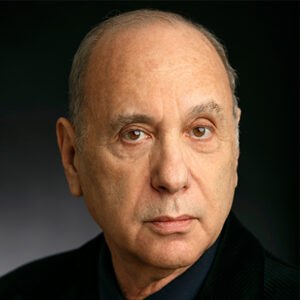Marshall Brickman, born in Brazil of American parents, attended New York public schools and the University of Wisconsin, where he received a double baccalaureate in both science and music.
He entered show business first as a member of the folk group The Tarriers and then, along with John and Michelle Phillips, as one of The New Journeymen, a precursor of The Mamas and the Papas, whose flamboyant life-style and eccentric harmonies defined the post-folk era of tuning up, turning on and cashing in.
Trading in his Gibson Mastertone 5-string banjo for an IBM Selectric, he secured a position as writer/director on Candid Camera, America’s original reality show, a wildly successful early experiment in monetizing public humiliation, for which he hereby apologizes.
Fleeing Candid Camera, Brickman found solace as head writer for Johnny Carson, whose late-night show on NBC emanated from the ironically named Radio City in midtown Manhattan, a stroke of luck that allowed him to stay as far from Los Angles as possible while still retaining U.S. citizenship. In 1970 he left NBC to become producer/head writer of Dick Cavett’s late-night show on ABC. Among the many ground-breaking events that Cavett introduced into the late-night formula was the night presidential hopeful George McGovern was interviewed by last-minute guest host Bill Russell of the Boston Celtics. The result was fascinating, not unlike watching a python ingesting a small cow.
Mr. Brickman’s film work as author (or co-author with Woody Allen) includes Sleeper, Annie Hall (Academy Award), Manhattan, (Academy Award nomination) and Manhattan Murder Mystery. As film writer/director:Simon, Lovesick, The Manhattan Project, Sister Mary Explains it All. In television: The Tonight Show with Johnny Carson (head writer, 1967-’70); The Dick Cavett Show (head writer/co-producer, 1970-’72).
Brickman’s recording (with ex-Tarrier Eric Weissberg) of the soundtrack of Deliverance, released in 1970, contained the surprise hit “Dueling Banjos,” achieved platinum status, and remains a healthy seller over 40 years later.
His first foray into musical theater resulted in Jersey Boys, which won the Tony, Olivier, Helpmann, Grammy and many other awards worldwide, has been seen by twenty million people worldwide and is one of the longest running shows in the history of Broadway. The film version of the show was directed by Clint Eastwood.
Mr. Brickman’s other theatrical efforts include Turn of the Century, which played to capacity houses in Chicago, and The Addams Family, starring Nathan Lane and Bebe Neuwirth, which ran for two years on Broadway and to date has had over four thousand first and second tier productions internationally.
In addition to his work in film and theater, Mr. Brickman was published in The New York Times, The New Yorker, Playboy and other periodicals. He was the 2006 recipient of the Writers’ Guild of America Ian McClellan Hunter Award for Lifetime Achievement.
After over 40 years in the business, trying to balance talent with opportunity and watching the careers of colleagues, both successful and less so, he can reduce what he’s learned into one succinct bit of wisdom: above all, it’s important to be lucky.
